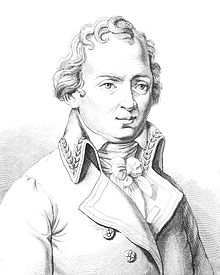Charles François Dupuis
Charles François Dupuis (born October 16, 1742 in Trie-Château , † September 29, 1809 in Échevannes , canton Is-sur-Tille ) was a French scholar and politician of the Enlightenment , the French Revolution and the early days of Napoléon Bonaparte .
Life
Dupuis was the son of a village school teacher. Admitted to the Collège d'Harcourt on the recommendation of the Duke de la Rochefoucauld , he became professor of rhetoric at the Collège de Lisieux in Paris in 1766 , then turned to astronomy under Lalande's influence and excited with his Mémoire sur l'origine des constellations et sur l'explication de la fable par le moyen de l'astronomie (1771), in which he interpreted the myths and religions as astronomical and physical allegories, caused a general sensation. The reconnaissance was in 1787 the chair of Latin eloquence at the Collège de France . Frederick the Great offered him a position as secretary in 1786, but he could not take it because the ruler of enlightened absolutism died that same year. In 1788 Dupuis became a member of the Academy of Inscriptions ( Académie des inscriptions et belles-lettres ).
During the French Revolution he was elected to the National Convention, then he was a member of the Council of Five Hundred and finally of the legislative body (until 1802), of which he became president after the coup d'état of 18th Brumaire VIII on November 9, 1799. In April 1806 he was accepted into the Legion of Honor . In 1809 he died on his estate in Échevannes.
His main work L'origine de tous les cultes, ou la réligion universelle (Paris 1795, new edition 1835–1837), expanded the teaching of memoire from 1781; an extract from it (first published in 1796) has been reprinted many times. This was followed by a dissertation on le zodiaque de Tentyra ou Denderah (1802) and Mémoire explicatif du zodiaque chronologique et mythologique (1806), which were also reprinted.
Works
- Mémoire sur l'origine des constellations et sur l'explication de la fable par le moyen de l'astronomie (1781)
- L'origine de tous les cultes, ou la réligion universelle (1794)
- Dissertation on the zodiaque de Tentyra ou Denderah (1802)
- Mémoire explicatif du zodiaque chronologique et mythologique (1806)
See also
| personal data | |
|---|---|
| SURNAME | Dupuis, Charles François |
| BRIEF DESCRIPTION | French scholar |
| DATE OF BIRTH | October 16, 1742 |
| PLACE OF BIRTH | Trie-Château |
| DATE OF DEATH | September 29, 1809 |
| Place of death | Échevannes , Canton of Is-sur-Tille |
